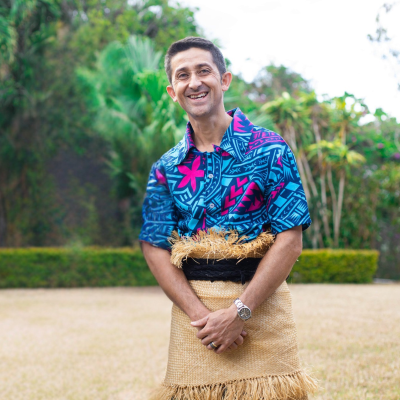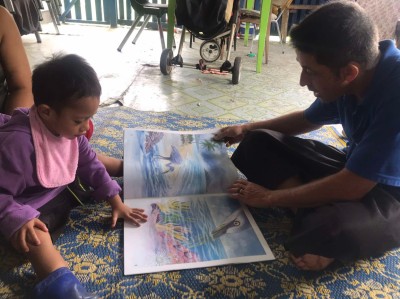Building inclusivity in developing communities involves VSA volunteers working hand-in-hand with local organisations and communities to support healthcare and education initiatives, promote sustainable development and empower local leaders. Through this work – whether launching community-driven programmes or improving access to education for children with special needs – these organisations, with the support of our volunteers, create life-changing impacts.
One such volunteer making a profound impact is Tevita Mafi who has been working in Tongatapu, the main island of Tonga, on a VSA assignment as a Special Needs Education Advisor. His efforts are transforming the lives of children and their families. In Tongatapu, the work of ‘Uluaki Faiako, a local organisation that partners with first-time parents and caregivers, has had a profound effect not only on the children but also on their families and the broader community. Tevita has supported them by sharing his skills and expertise, encouraging the integration of children with special needs into everyday life and educating others on how to treat them as equal members of society.

VSA volunteer Tevita Mafi currently on assignment as a Special Needs Education Advisor in Tongatapu
One mother shared how Tevita’s training has encouraged fathers to become more involved in their children’s care and education, noting that, before Tevita’s work, only mothers attended the training sessions. Now, both parents are equally invested in the well-being of their children, fostering a more inclusive and supportive family dynamic: “[His trainings] really helped because now the fathers realise that it is their responsibility as well to come and play with the kids, not just the mothers. This is one major difference I have witnessed as a result of Tevita’s work.”
Tevita’s approach has been both practical and transformative. With his background in special education, he has shared his expertise with families and staff in Tongatapu, where resources and formal training for special needs education are limited. His training sessions have equipped both caregivers and local staff with the skills to support children with special needs, ensuring that these lessons will continue to benefit the community long after his assignment is completed.
A past colleague from ‘Uluaki Faiako expressed her gratitude in what she has learnt since working with Tevita: “We work with disabled children who have many types of disabilities, and I have come to understand how to deal with those with cerebral palsy through Tevita’s trainings. I had no idea how to handle such cases, and I now know through his training... we have learnt so much.” The staff now have the tools to implement these techniques well beyond Tevita’s assignment, ensuring sustainable change in the community.
Through Tevita’s example, both families and staff have learned to integrate children with special needs into daily life, including them in household chores to help them strengthen their muscles and develop important physical skills. This approach not only improves the children’s physical abilities but also fosters a sense of belonging and purpose for the child within their family and community.

Tevita supports a young child reading a picture book
The local organisations that we partner with, such as ‘Uluaki Faiako, are essential to building stronger communities. ‘Uluaki Faiako plays a crucial role in providing access to education, therapy, and essential resources to children with special needs and their families. While individual contributions make a difference, long-term impact depends on the continued support from both organisations such as VSA and the generosity of the public. Supporting these initiatives ensures that children with special needs receive the assistance they need to develop skills, gain independence, and participate fully in their homes and wider communities.
